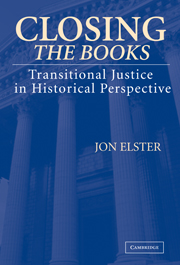PART I - THE UNIVERSE OF TRANSITIONAL JUSTICE
Published online by Cambridge University Press: 17 November 2009
Summary
Transitional justice is made up of the processes of trials, purges, and reparations that take place after the transition from one political regime to another. A fuller characterization is provided in Chapter 4. The task of the present book is, first, to describe the variety of cases of transitional justice and, second, to propose an analytical framework that can help us explain the variations among the cases. Part I is devoted to presentation of the cases. In the first two chapters I describe several historical examples in some detail. Chapter 1 describes the processes of transitional justice that occurred in the wake of the restorations of Athenian democracy in 411 and then again in 403 b.c. In Chapter 2, I discuss the measures of retribution and reparation that took place in France after the two Restorations of the Bourbon monarchy in 1814 and 1815. Chapter 3 is a more compact survey of transitional justice in other cases, mainly transitions to democracy in the twentieth century.
There are several reasons that I single out the Athenian and French episodes for a fuller discussion than what I provide for other cases. First, they will be less known to most readers than the more recent cases. Second, they show that transitional justice is not limited to modern regimes nor to democratic regimes. Third, both cases show exceptionally clearly that in transitional justice, nations can learn from experience.
- Type
- Chapter
- Information
- Closing the BooksTransitional Justice in Historical Perspective, pp. 1 - 2Publisher: Cambridge University PressPrint publication year: 2004



